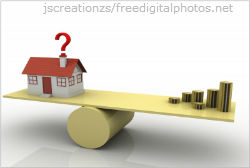|
Get Free Moving Quotes
|
|
How to Budget for Buying a Home |
|
Rating : 3.0/5
based on 1 visitor(s) 191 Views
|
|
|
|
|
|
| A house is often the most expensive thing an average person will ever attempt to purchase. You need to make an accurate budget for buying a home before you attempt to purchase a property. Financing a home can be complicated, however, so it is important to try to keep track of everything that you'll have to pay for the whole process. What can make a home more expensive? There are several things that you need to consider when budgeting for buying a home, but the most important things to consider are what kind of home you want and how much are you willing to pay for it.
Before you budget, you should probably have a rough estimate of the maximum amount of money you will be able to spend. You need to think about what you want out of your home, and then peel back your expectations to keep the list of possible homes within your price range. Here are some factors that will cause a home to be more expensive:
- Location. If your home is near or in a city, the value of the home increases. There is a reason why they call it "prime real estate"
- Age. New houses are generally more expensive
- Size. The square footage is a basic measurement of how big, and expensive, you can expect the home to be
- Number of bedrooms and bathrooms. These essential rooms in a home basically indicate the number of people that can inhabit it, so these numbers can directly drive the cost up as they increase
- Acreage of the yard/outdoor property
- Special features like pools, or gyms can add to a home's cost
- Additional utilities like extra cable or internet service
Consider repairs/renovations
Sometimes a seller will sell a home at a discounted price because there is work to be done and the buyer is expected to pay for it to be done. The basement may be unfinished, the plumbing may need updating, or the layout of some walls are not desirable. The costs of renovating a new house should be counted in your budget for buying a home. You shouldn't buy a home unless you can actually live there comfortably, so you should consider necessary renovation costs part of the price of the house when shopping for a home.
Beware of closing costs
Closing costs are usually paid by the buyer. These costs are mostly required to cover the various legal fees associated with inspections, credit reports, and getting mortgage information from lenders. They tend to range from $2,000- $4,000. The seller should have a better idea of what the closing costs may be, and they are legally required to give you a good faith estimate of what it will cost if you ask them. In some cases the seller will agree to pay a portion of the closing costs.Figuring out a mortgage plan and considering all the involved expenses 
A mortgage is usually necessary when buying a home. You find a lender who is willing to lend you a large sum of money so you can afford to make the large purchase. There will be an initial down payment for the house you will have to pay, but you then pay the lender back with interest in monthly payments for a specific period of time.
Different mortgages have different interest rates which can either be fixed or adjusted over time.
Credit score/ financial history
Your credit score, a number that is given to you based on how much credit you have used and paid back on time, will be a big factor in determining what kind of down payment or interest rate you will get. Lenders also check to see if you have money saved and a steady job before they're willing to give you a loan. If the lender has faith that you will continue to make money and pay them for the length of your mortgage, your down payment and rate will be low.
Consider all of your monthly expenses
When you set up a mortgage with a lender, it basically means that you are not paying for your house all at once, but rather over the course of the mortgage's term. Before you agree with a particular lender's interest rate and payment plan, you need to consider how a mortgage payment will fit into your budget along with your other monthly expenses:
- Utilities
- Home maintenance
- Property taxes
- Other loans you have (like student loans)
- Health/car/home/life insurance
- Credit bills
Shop around for multiple lenders to get the best mortgage possible for your credit score and financial history. Just remember that mortgage payments are essentially part of the home buying budget and if you can't afford to make the payments, you can't afford to buy the home.
Don't forget the costs of moving
A moving budget may not be included with a budget for buying a home, but if you plan on moving in to your new property anytime soon, you probably will spend money on the move close to the same time as you spend the money on the purchase of your home. You're going to want to get a good deal, regardless, so you need to compare quotes and movers until you find the best deal for you. |
|
 |
Author : Mike Sannitti
on August 7, 2014
TopMoving.ca - Moving Expert
|
| |